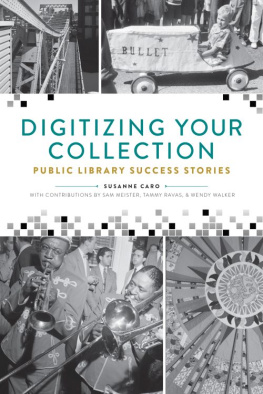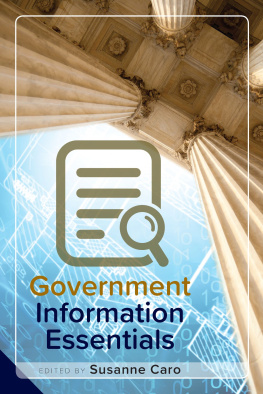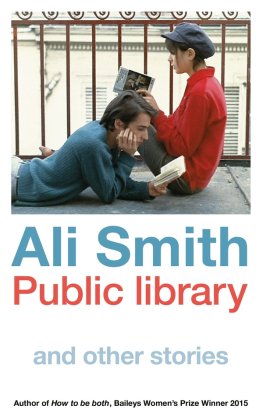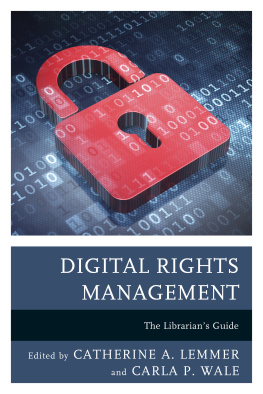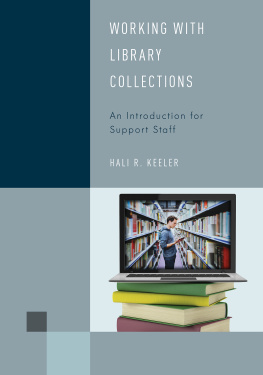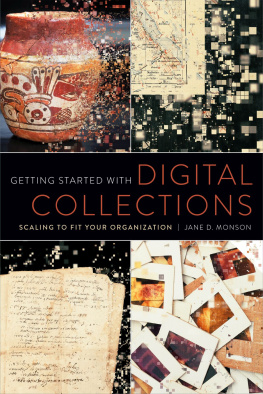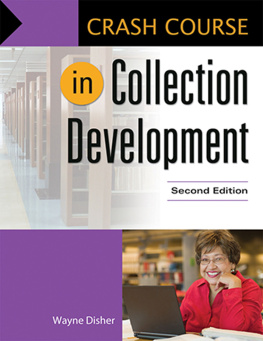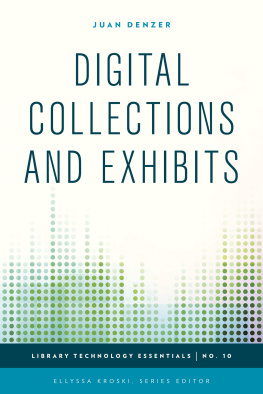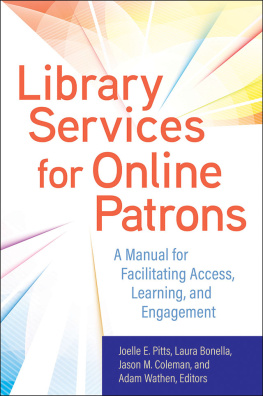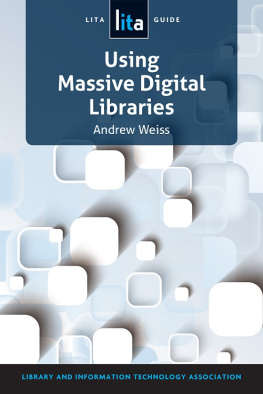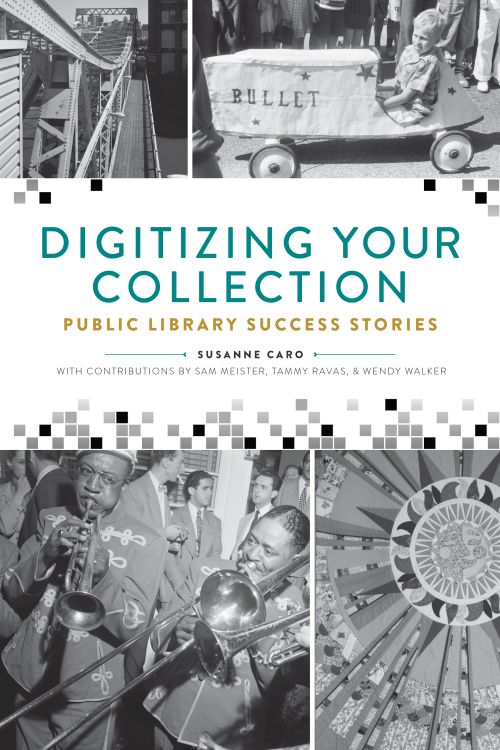
ALA Editions purchases fund advocacy, awareness, and accreditation programs for library professionals worldwide.
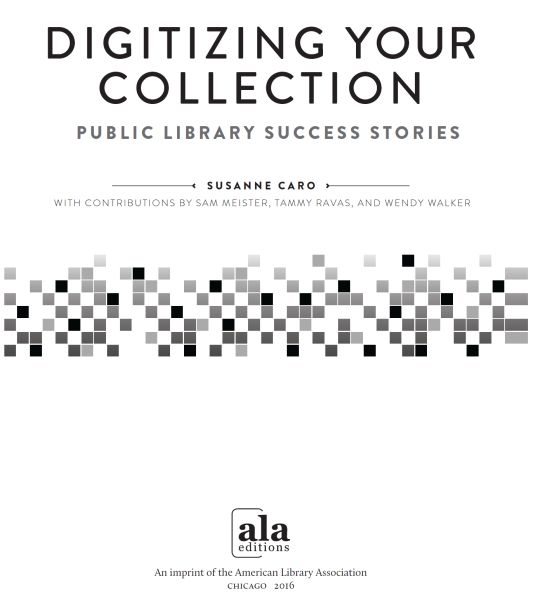
2016 by the American Library Association
Extensive effort has gone into ensuring the reliability of the information in this book; however, the publisher makes no warranty, express or implied, with respect to the material contained herein.
ISBNs
978-0-8389-1383-3 (paper)
978-0-8389-1400-7 (PDF)
978-0-8389-1401-4 (ePub)
978-0-8389-1402-1 (Kindle)
Library of Congress Cataloging-in-Publication Data
Names: Caro, Susanne, 1980- author. | Meister, Sam, author. | Ravas, Tammy, 1977- author. | Walker, Wendy, 1974- author.
Title: Digitizing your collection : public library success stories / Susanne Caro ; with contributions by Sam Meister, Tammy Ravas, and Wendy Walker.
Description: Chicago : ALA Editions, an imprint of the American Library Association, 2016. | Includes .
Identifiers: LCCN 2015032866 | ISBN 9780838913833 (print : alk. paper)
Subjects: LCSH: Library materialsDigitization. | Library materialsConservation and restoration. | LibrariesSpecial collectionsElectronic information resources. | Digital preservation. | Public librariesUnited StatesCase studies.
Classification: LCC Z701.3.D54 C37 2016 | DDC 025.8/4dc23 LC record available at http://lccn.loc.gov/2015032866
Cover images courtesy of the Library of Congress.
CONTENTS
T he state librarian had declared we would have a digitization project and the task fell to me. I had no experience and had to develop the project from the ground up. My search for papers and other documentation provided best practices but no examples of how libraries like mine managed with little budget and few staff. That project, and a desire to collect stories of how libraries manage to place great resources online led to this book. During this project I learned the importance of having support both inside and outside of my library. I owe a great deal of thanks to Monica Villaire-Garcia who mastered the metadata and Laurie Canepa, my supervisor who provided so much support, and Shelley Thompson and Cynthia Baughman of El Palacio magazine, who were eager to have 100 years of their magazine online.
As the idea of collecting these stories was developed I asked three of my talented colleagues to lend their expertise. Professor Wendy Walker had experience with creating a digital collection in Nevada. She provided insights, interviewed several librarians, and provided considerable editing assistance. Digital Preservationist Sam Meister is well versed in how to maintain and care for digital files, and this knowledge is reflected in his chapter on Digital Preservation. Tammy Ravas wrote the chapter on Digitizing Copyrighted Materials.
I would also like to thank the many librarians around the country who were willing to answer my many questions and share their stories.
WHY DIGITIZE?
We are that public library ideal of a peoples university and the way we are connecting with our public is changing, but I think the goals of that connection are no different.
Eileen OConnell, branch manager, Special Collections Library, Albuquerque/Bernalillo County Library, New Mexico
L ibrary patrons continue to expect more online content, and libraries are attempting to meet these expectations with article databases and e-book collections. According to a 2011 survey by the Institute of Museum and Library Services (IMLS), libraries had 35 million e-books available. Why should libraries invest additional time and funds to scan old paper documents, add metadata and store them in an accessible electronic collection when they are already providing access to databases? As your community accesses your collection online and uses more electronic content your collections can be hidden if they are not accessible online. Through digitization you can increase access and awareness of your unique collections, from fragile photographs to microfilm. The electronic versions act as surrogates, reducing handling of the originals, and can be used to preserve your valuable, tangible materials.
EXPECTATIONS OF YOUR COMMUNITY
As digital technology becomes more ubiquitous in daily life it can be easy to forget that it was not always there. On library discussion lists such as Publibs, librarians often share head-scratching requests: people looking for film of Lincolns assassination, photographs of George Washington or Jesus.These types of interactions will only increase over time. The Mindset List, published by Beloit College each year, provides insights into the experiences that have shaped incoming college freshmen. The class of 2015 has always had Internet access. The class of 2016 has always lived in cyberspace and prefers digital cameras, and the class of 2017 has always had access to the Global Positioning System (GPS). Soon there will be college freshmen who have always had access to e-books.
As more people are born into a world where most information is created digitally, the expectation for all library collections to be available electronically will continue to grow and users will expect that content to be available in a variety of formats and on multiple devices. The number of people with Internet access in the United States has increased significantly over the last ten years. In 2013 the U.S. Census estimated that 83.8 percent of households had a computer, and 73.4 percent had Internet access. In 2013 the Federal Communications Commission reported 86 million residential fixed-location Internet connections and 142 million mobile wireless service subscribers.
The desire to access materials online is part of a trend in libraries toward digital inclusion and providing a range of digital content and access options. Digital inclusion is described as having three to four aspects. A Pew Research Study looked at access, adoption, and application while the Digital Inclusion survey considered public access, digital content, digital literacy, and domain-specific services and programs. Public libraries strive to meet the technology needs of their users, and as more people become accustomed to accessing e-books and online articles they will expect to find other library materials online as well. It is a good strategy to engage users by including digital versions of a librarys unique holdings in addition to the latest best sellers or magazines.
DIGITIZING TO IMPROVE ACCESS
Digital access redefines a library community from geographically-based to interest-based. Individuals who no longer live in their hometown are able to Town reports, vital statistics, planning documents, committee minutes, and more can be made available through the librarys digital collections.
Online access can increase interest in your collections and the use of the tangible materials by increasing discovery and awareness of your holdings. According to librarian Julie Warren, images from the collection at Georgetown County Library have been used by ABC Nightly News and PBS for news programs and Antiques Roadshow. Library users value the ability to access digital collections and consider digitization to be an important service. Madison Library in New Hampshire surveyed the town to learn how the community ranked library services, including their digitization efforts. According to former director Mary Cronin, the results revealed that 78 percent of people felt it was important or very important for the library to continue to add to its digital collections. Online collections allow libraries to reach users outside of the physical library building and to meet user expectations for digital resources. Once a collection is online it is set free; it is available around the world at any time.

